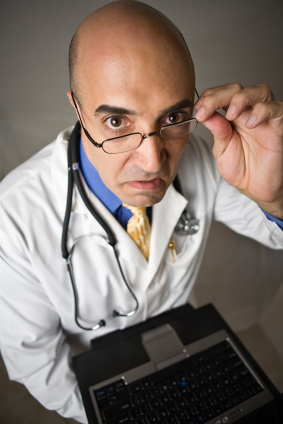A few of the main reasons it is crucial to get an honest reputable doctor when dealing with getting compensation for medical bills after a wreck is that a doctor who is dishonest might:
Falsify Reports: For instance, your doctor might put in his daily report on your treatment that you are getting better to make him look like he is actually treating you successfully. I personally encountered this where I told the doctor I was experiencing a pain level of 7 and he reported that I said a 5. This could come back to haunt you when attempting to reach a settlement, because if an official doctor’s report says you are better, your word that you are still in pain is not taken seriously.
TIP: ALWAYS CHECK WHAT THE DOCTOR’S REPORT SAYS. ASK FOR A COPY EVERY NOW AND THEN. IT IS YOUR RIGHT!
Rack-up Medical Bills: Simply because a doctor knows that you are not self-pay and an insurance company is paying, they will try to get the most out of the situation. This may include charging for services never rendered or giving you too much treatment that is not really beneficial to your health like seeing you five times a week instead of three.
TIP: BE THE CONCERNED PATIENT & ASK WHY YOU ARE RECEIVING A CERTAIN COURSE OF TREATMENT.
If something like this were to happen your insurance company may refuse to pay and stick you will the bills or they make attempt to call the doctor behind your back to negotiate you bill which makes for a very uncomfortable situation when you to go back and see this doctor.
If the doctor is unethical he/she may be passive aggressive about the occurrence which could lead to mistreatment or loss of medical records as in my case. So even though you are not paying your bills, it is a good idea to keep up-to-date on what services and products your doctor is charging you.
Won Treat Need Properly: When all you might need is a few minor services or medications your doctor may order un-needed expensive tests which are not conducive to your health.
Waist of Time and Money: If your doctor is not concerned about your health and doesn’t listen to your pain, then you are loosing out on a small window of opportunity in which you are more susceptible to achieving a full recovery. This is something no amount of money can compensate for. Only go to a doctor who listens to you and is willing to treat your need and not his/her needs.
TIP: IF SOMETHING IS FISHY ABOUT THE WAY DOCTOR IS TREATING YOU, MAKE SURE YOU ASK FOR ALL MEDICAL RECORDS BEFORE ACTUALLY DISCONTINUING SERVICE, BECAUSE AFTER YOU ARE NO LONGER A PATIENT THEY WILL NOT BE AS WILLING TO WORK WITH YOU.

